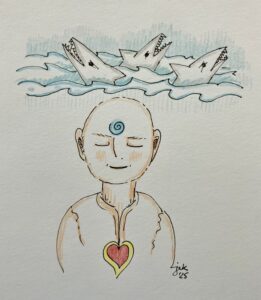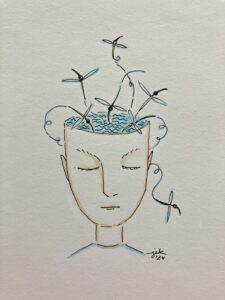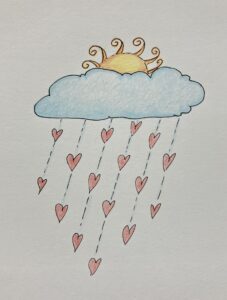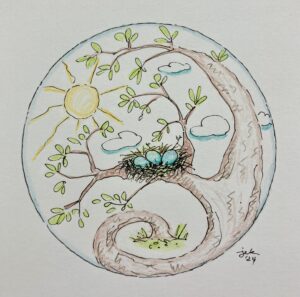
-Artwork © 2025 Jan Ketchel
“…the only thing we have to fear is fear itself—nameless, unreasoning, unjustified terror which paralyzes needed efforts to convert retreat into advance,” stated Franklin Roosevelt in his first inaugural address.
Fearful thoughts literally have substance. The substance of our thoughts is the energetic play of our imagination, the building blocks of what will become substantial physical reality. Fearful thoughts manifest as earthquakes and solar flares in the physical body.
When we imagine, we engage the subtle energy of the astral world, the next stop on our infinite journey beyond life in this physical world. The currency and subtle building materials of that world are thought and imagination.
When we imagine, while in physical form, our mind shifts to the astral plane as we channel its creative capacity to give substance and form to our desires in this world. This is how the subconscious mind manifests our suggestions. What we imagine, with feeling, the subconscious mind brings to life.
At present, our world is teeming with warring thoughts. These outer thought munitions infiltrate the mind with images and emotions that suggest terror to the subconscious mind. This results in paralytic panic in the physical body, which charges the imagination to create even more fearful outcomes, a vicious cycle continuously escalating and spinning out of control.
The real battlefield for this unrelenting attack is the mind itself. At the quantum dimension of our being we are a fully interconnected ocean of thoughts, telepathically exposed to all thoughts. Exposure to thought is one thing, absorption of thought is something else.
Absorbing thought means attaching to a thought, as we doggedly think about it. This incessant attention allows the substance of the thought to subtlety take control of the mind. Even if we disagree with a thought, by mentally and emotionally fighting with it, we increase its power over us because it becomes the central focus of our attention, usurping our vital energy.
To attack in your mind whatever you fear is to become lucid. In a dream state, lucidity allows us to wake up and take charge of the progression of a dream. To become lucid in waking reality is to become aware of the thoughts we have unconsciously become enslaved by, and then to exercise our innate ability to choose where we spend our attention.
Detachment is freedom of attention. With detachment we become emotionally neutral and objective. We are afforded views of current events that clarify the cosmic cycles behind the current dance of humanity. Our narcissistic worldview, that ordinarily has us take things so personally, becomes neutral and objective, despite the horrors of the present. Though not robbed of our compassion, we absorb no grievance.
This freedom of refined attention is aided by guides and intuitions issued from the higher planes of the astral world, from helpful souls who have reached total acceptance of all that is, and seek only the truth. We open to these positive channels of truth as we exercise our lucidity and attack in the mind whatever we fear.
Wake up to the state of your mind and reclaim all of its power by releasing, with love, the thoughts that once bound you to fear. Think only of the greater good for all.
The Greater Good for All,
Chuck
Inspiration for this blog: Your Forces And How To Use Them by Prentice Mulford




